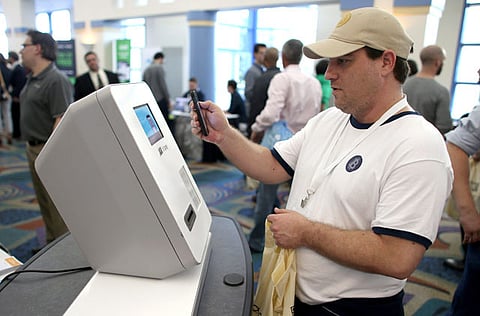The A,B,C of virtual currency Bitcoin
It remains largely disconnected from the global banking payment systems

Dubai: At a time when the world is awash with cheap paper currencies, the rapid appreciation of the borderless virtual currency, the so-called “Bitcoin”, has attracted a lot of media and public attention. Trading at less than five cents in 2010, the market value of one Bitcoin exceeded US$1,200 (Dh4,407) in November 2013. Currently, there are approximately 12 million Bitcoins in circulation, representing a market value of over $14 billion, well above Iceland’s nominal GDP recorded in 2012. The purpose of this note is to shed some light for starters (like myself) who are puzzled, and sometimes annoyed, for knowing almost nothing about it.
So, what is a Bitcoin? Bitcoins were introduced in 2008–09 by some unidentified person (or persons) and are created by a complex mathematic programming. Unlike paper currencies, there isn’t a specified central bank who manages the production of Bitcoins, instead they are managed through a public network of peer-to-peer computers.
So, if you want to get hold of some Bitcoins, you can obtain them only after you solve some pre-specified mathematical problems. If you’re lucky to get a Bitcoin, you would be known as a Bitcoin miner, something similar to gold mining. But, unlike gold, Bitcoin is a finite resource and its circulation is capped at 21 million, which would be reached in the year 2140.
Is Bitcoin a real currency? A general rule of thumb is that to be eligible as money, it must satisfy the following three characteristics: as a medium of exchange, a unit of account and a store of value. From online products to getting physical or materials products, or even professional services such as health or legal help, a growing number of merchants, especially in the Western countries, are accepting Bitcoin as a form of payment. So, to a large extent, Bitcoins satisfy the first property of a money.
But, as recently pointed out by Professor David Yermack of Stern School of Business in New York, as a stable unit of account or a store of value, Bitcoin scores very poorly. The main reason for this is the excessive volatility in the value of an individual Bitcoin. According to his calculation, between January and November 2013, the volatility of the Bitcoin-Dollar exchange rate has been 133 per cent, compared to 8 per cent to 12 per cent volatilities of major currencies such as the dollar and euro. To see it another way, during the same period, gold exhibited a volatility of 22 per cent, while the volatilities of most widely traded stocks have been in the range of 20 to 30 per cent. This high riskiness of Bitcoin undermines its ability to act as a store of value or function as a unit of account.
Co-movement with major currencies
Besides the outsized volatility, Bitcoin also has a poor record of co-movement with the world’s major currencies. Professor Yermack estimated that between July 2010 and November 2013, the Bitcoin-Dollar exchange rate exhibited almost zero correlation with euro, pound, yen and the price of gold. This lack of correlation with international currencies makes Bitcoin an ineffective tool of risk management, as it will be difficult to hedge any risks that might affect Bitcoin itself.
Moreover, until now, Bitcoin remains largely disconnected from the global banking payment systems, primarily because unlike other currencies, Bitcoins are not protected by layers of regulation, deposit insurance and international treaties. Multinationals, for example, who deal in more than one currency have so far remained disconnected from Bitcoins.
However, Bitcoins recently caught the attention of the Silicon Valley, who presumes that Bitcoins can be used to build a new digital finance industry rather than just as a vehicle for speculation. Supporters of Bitcoin argue that the shared protocols and common technology standards on which it is based could make the foundation for a low-cost, standards-based financial system independent of the traditional banking industry.
But, according to Alex Payne, a tech programmer and writer, it is still unclear how Bitcoin can play a role in improving the condition of the “underbanked”, who are in desperate need of financial services that would empower them to participate fully in the global economy without fear of exploitation.
Nevertheless, for the fans of Bitcoins, there are reasons to cheer following Fed’s outgoing chairman Ben Bernanke’s tacit endorsement for the digital currency. In a recent congressional hearings, Bernanke said that virtual currencies like Bitcoins “may hold long-term promise, particularly if the innovations promote a faster, more secure and more efficient payment system.”
Ban on trading in China
Thus, despite the recent setback in China, where Bitcoins have been banned from trading by Chinese commercial banks, the Fed’s endorsement and the fact that Wall Street firms such as the Bank of America Merrill Lynch has begun to promote Bitcoin in e-commerce and money transfers may pave the way for Bitcoins to become a frictionless and extremely cheap method for moving money around the world.
As a final remark, the fact that the production of each new Bitcoin involves solving layers and layers of computational puzzles makes it difficult (though not impossible) for a hacker to steal Bitcoins. No one can know the future, but there are several reasons for expecting a more brighter future for Bitcoin.
— The author is a former economist at the Qatar Central Bank. The views expressed are personal.
Sign up for the Daily Briefing
Get the latest news and updates straight to your inbox


